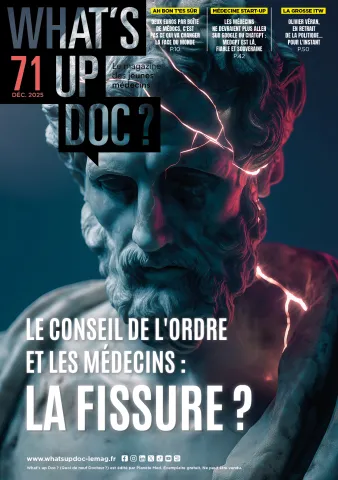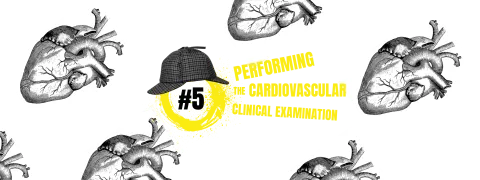
Doctor Tab : Good morning, Mister Prendis – what can I do for you today?
Mr. Prendis : Well, Doctor, since the last time I saw you, you remember, I said I was feeling a bit run down and generally out of sorts, well I’ve started getting these blinding headaches. They seem to be getting more and more frequent and worse and worse. It’s pretty unbearable. I’ve started taking paracetamol with codeine, but they’re not giving much relief any more.
Doctor Tab : Yes, I remember - it was at the end of June. We thought it was just a question of burn-out, and that your holidays would give you a break to relax and get your energy back. And of course, you had Covid in April, and there was a possibility that you hadn’t quite got over it.
Mr. Prendis : That’s right, and I did feel slightly better after our week in Cornwall, but then the headaches started, and it’s been downhill ever since.
Doctor Tab : I see. I think I’d better give you a thorough check-up, but first of all, can you tell me where the pain is?
Mr. Prendis : Well it’s a generalized headache, but I notice that my temples are a bit sore to the touch and it hurts when I comb my hair – the comb against my scalp is rather painful, so I have to do it very lightly. As well as that, I sometimes feel a bit of pain in my jaw when I’m eating. And I also feel a bit stiff in my neck and shoulders, but that might just be too much air-conditioning in the car.
Doctor Tab : Have you noticed any weight loss at all?
Mr. Prendis : No – I don’t think so, but I don’t weigh myself much.
Doctor Tab : Fine – and any vision problems, you know, double vision or vision loss?
Mr. Prendis : No, my eyesight hasn’t changed at all.
Doctor Tab : Right – let me have a look at your temples.
Mr. Prendis : That hurts!
Doctor Tab : Sorry Mr. Prendis. The arteries don’t seem to be as supple as they should be, and the pulse seems to be pretty weak. I think you may be suffering from temporal arteritis. It’s inflammation of the temporal arteries.
Mr. Prendis : Oh dear! Is it serious?
Doctor Tab : It can be, it can lead to irreversible blindness if it’s not treated quickly, so we’ll have to do some tests to confirm the diagnosis as soon as possible. Once they’ve been done, we can start the treatment.
Mr. Prendis : What tests will I have to do?
Doctor Tab : You’ll need blood tests to look for inflammation, a biopsy of your temporal artery, which is quite painless with local anaesthesia, and a PET scan to see if other arteries are affected. I’ll give you a prescription for those now, and you should make an appointment at the hospital today, if possible. For the moment, your eyesight hasn’t suffered, but we mustn’t waste any time.
Mr. Prendis : What is the treatment for this illness?
Doctor Tab : You’ll need to take high-dose corticosteroids, and you should feel the benefits of the treatment on your headaches in a matter of days. It’s a long-term treatment though – you may have to take these drugs for perhaps two years or longer. It depends on how you respond, and later on we can look at reducing the doses - it’s called tapering - when the arteritis is under control.
Mr. Prendis : Thank you, Doctor. I’ll telephone the hospital right away.

|
Exercise 2. This dialogue includes many comparatives. Can you find the right form of comparison in the following sentences? Ex. They seem to be getting more and more frequent and worse and worse.
1. They were (kind) to me as anyone could be. 2. I think Pr Webster is (hard) and (ruthless) man I have ever met. 3. Going to bed early does not make it any (easy) to get up on time. 4. Don’t worry! It was bound to happen (soon) or (late). 5. She has been ill, but she looks much (well) now. 6. You’d better ask for (far) information. 7. She felt all (bad) as she had expected the symptoms to disappear quickly. 8. It is said that (hard) you work, (good) you feel. 9. They both look very much the same, but John is by far the (intelligent). 10. Being unemployed is (bad) experience I have ever had.
|
A brief historical background
The name of this eponymous disease could prove to be a real headache. Although the descriptive terms "giant cell arteritis" and "temporal arteritis" are sometimes used interchangeably, because of the frequent involvement of the temporal artery, to describe "arteritis cranialis", the disease is commonly known as Horton's disease. As a matter of fact, the condition was named after Bayard Taylor Horton (1895-1980), an American professor of biology at Emory and Henry College in Emory (Virginia), from 1923 to 1925. In 1925, Horton began his fellowship in medicine at the Mayo Graduate School of Medicine (Minnesota), where he became a staff member in 1929. In 1932, Horton, Magath and Brown reported two cases of a new form of arteritis affecting the temporal vessels, which, they assumed, represented a new clinical syndrome. In 1934 and 1936, Horton published new cases of temporal arteritis and defined the clinical characteristics of the disease and its histology. His name is also associated with Horton's headache or syndrome, also known as "cluster headache".
Joke of the day
What did the blood cell say before it died in an artery?
I will not die in vein!
Didier CARNET, Jean-Pierre CHARPY, Philip BASTABLE, Professeurs d'anglais médical à l'Université de Dijon













